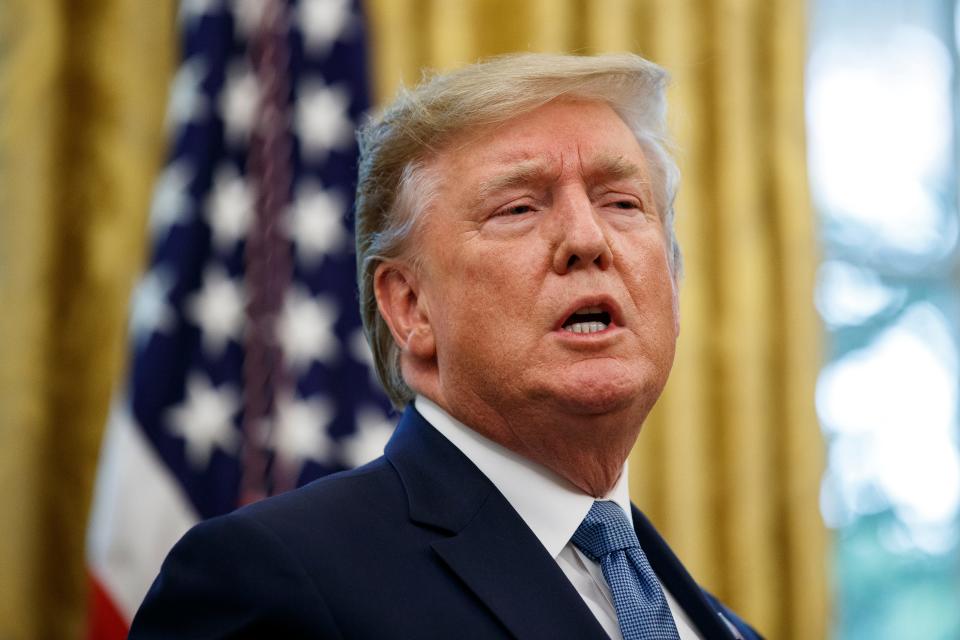Trump places tariffs on $300 billion in additional Chinese goods in trade war
WASHINGTON – Dramatically escalating an ongoing trade war between the United States and China, President Donald Trump said Friday he will raise tariffs on $550 billion in Chinese goods in response to barriers imposed hours earlier by Beijing.
Trump said he would raise from 25% to 30% U.S. tariffs on $250 billion in Chinese products and would increase from 10% to 15% new tariffs on a remaining $300 billion in goods – some of which are set to take effect next month. The announcement came shortly after China said it would levy its own tariffs on U.S. imports, prompting a market sell-off.
The president's all-in move followed a day of angry recriminations on Twitter that appeared at times to catch White House aides off guard. After suggesting for weeks that talks to alleviate trade tensions with China were progressing, the president at one point asserted that "we don't need China" and that the U.S. would be "far better off without" it.
More: Trump 'hereby orders' companies to seek 'alternative' markets to China as markets plunge
As the Dow Jones Industrial Average plunged more than 600 points, business groups such as the U.S. Chamber of Commerce, urged caution as they tiptoed around a midday tweet from the president in which he claimed to have "hereby ordered" companies to seek alternative markets as a means to punish the world's second largest economy.
"Sadly, past Administrations have allowed China to get so far ahead of Fair and Balanced Trade that it has become a great burden to the American Taxpayer," Trump posted on Twitter later Friday. "As President, I can no longer allow this to happen!"
Higher tariffs on the $250 billion in goods will take effect Oct. 1, the White House said. The tariffs on some of the $300 billion in products will go into effect on Sept. 1. In a tacit acknowledgment of the potential squeeze the trade war could place on consumers during the holiday shopping season, Trump delayed some tariffs on consumer electronics, shoes and other products until mid-December.
The White House signaled that the delayed timeline on those tariffs would remain in effect.
The dizzying escalation of rhetoric came hours before the president heads to France for the G-7 meeting of world leaders – where the global economy and trade issues will take center stage. Trump is seeking global support for his efforts to squeeze trade practices in China that even some of his Democratic critics describe as unfair to the U.S.
More: China retaliates against the US with tariffs on $75B worth of American goods
But Trump's moves also came amid fears of a global economic slowdown, making investors jittery and causing several days of wild swings on Wall Street last week. Trump has argued that the tariffs have had little impact on the U.S. economy and that China has been forced to shoulder most of the burden.
The president has blamed the Federal Reserve for not doing more for the economy. In another series of tweets Friday, Trump described Fed Board Chairman Jay Powell as an "enemy" and likened him to Chinese leader Xi Jinping. Trump appointed Powell to the chairmanship in 2017.
"My only question is, who is our bigger enemy, Jay Powel or Chairman Xi?" Trump wrote, initially misspelling Powell's name.
More: Trump calls Fed Chairman Jay Powell 'enemy,' compares him to Chinese President Xi
Powell signaled Friday that the central bank will cut interest rates as soon as next month. But he also pointed to the trade disputes and noted that they are a challenge for the economy. He added that while interest rate policy "is a powerful tool that works to support consumer spending, business investment, and public confidence, it cannot provide a settled rule book for international trade."
China said Friday it would impose tariffs ranging from 5% to 10% on an additional $75 billion in U.S. goods, according to state media. The new tariffs are poised to go into effect in stages, with the first round beginning Sept. 1 and the second Dec. 15. China's Commerce Ministry said 5,078 products would be affected, including soybeans, fruit and seafood, coffee, cars, auto parts, chemicals, whiskey, cigars, clothing and TVs.
The developments drew concern from business groups.
"While we share the president’s frustration, we believe that continued, constructive engagement is the right way forward," Myron Brilliant, executive vice president and head of international affairs for the Chamber said in a statement. "Time is of the essence. We do not want to see a further deterioration of US-China relations."
David French, of the National Retail Federation, was more direct in his criticism.
"It's impossible for businesses to plan for the future in this type of environment," French said. "The administration's approach clearly isn't working, and the answer isn't more taxes on American businesses and consumers. Where does this end?"
But Trump seemed unfazed and instead piled on more U.S. tariffs in response.
"Thank you for your attention to this matter!" Trump wrote, concluding his tweets announcing the tariffs.

Contributing: Paul Davidson
This article originally appeared on USA TODAY: Donald Trump escalates China trade war with new tariffs on billions

